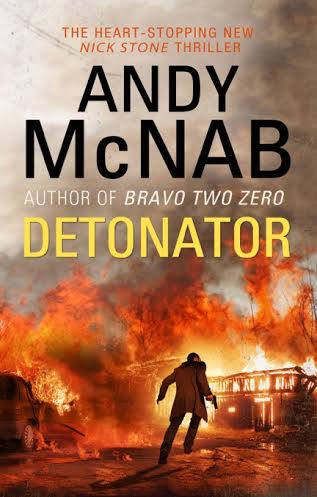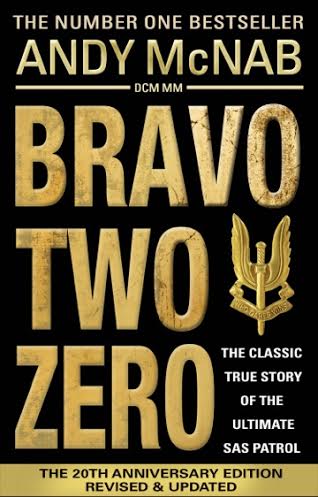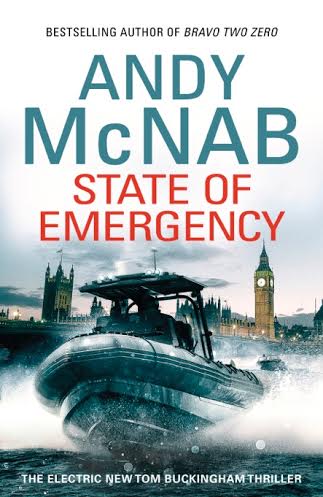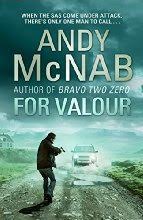Andy McNab was awarded both the Distinguished Conduct Medal (DCM) and Military Medal (MM) during his military career, and was the British Army’s most highly decorated serving soldier when he finally left the SAS. Since then he has become one of the world’s bestselling writers, drawing on his insider knowledge and experience.
As well as three nonfiction bestsellers, he is the author of the bestselling Nick Stone thrillers, several other fiction and non fiction titles as well as a series of books for young adults. Besides his writing work, he lectures to security and intelligence agencies in both the USA and UK, works in the film industry advising Hollywood on everything from covert procedure to training civilian actors to act like soldiers, writes for a variety of newspapers and magazines and campaigns tirelessly as a spokesperson and fundraiser for both military and literacy charities. Andy, Nick Stone, in Detonator, talks of knowledge equaling power. In one of your talks I sat in on at the Yeovil Literary Festival, you mentioned that your army tutor at your squad’s first literacy session explained that the ability to read was the route to education, which = knowledge, which in turn = power. This clearly resonated with you, even changed your life.
Andy, Nick Stone, in Detonator, talks of knowledge equaling power. In one of your talks I sat in on at the Yeovil Literary Festival, you mentioned that your army tutor at your squad’s first literacy session explained that the ability to read was the route to education, which = knowledge, which in turn = power. This clearly resonated with you, even changed your life.
You write non-fiction and fiction, which shows the importance of the latent abilities your tutor unearthed but have you felt the need to pass this equation to others? Perhaps through literacy charities? If so, what are they? Tell us more about how this equation has changed the lives of others.
Yes very much so. I was lucky enough to have been given an education by the Army, and I spend a lot of time now telling young people my story and encouraging them to make the most of educational opportunities on offer. I am an Ambassador for the Reading Agency, and through them visit many schools, prisons, Young Offender Units and workplaces every year. If I can get just one inmate, school kid or worker to change their reading habits or pick up a book for the first time, then it will have been worth it. My message is pretty simple, ‘If I can do it, anybody can.’
Was the transition from active participation and huge achievement in the SAS and then into civilian life tough? I suspect the adrenalin rush has taken a dive. The pace must be so different, and the focus.
Life is certainly not dull now. I get my adrenalin rushes elsewhere nowadays, whether its surfing, trekking to the South Pole as I have recently done or getting out and about on my motorbike. The pace of life is still pretty full on, I have projects on the go both in the UK and the US at the moment, but I’m not someone who enjoys taking time off, I like to keep busy.

The best account yet of the SAS in action – Sunday Times
Writing is something in which you have control, and focus. You can work on your own, at your own pace, which I suspect is frenetic. Is this one reason why you do it?
I like purpose and focus, and work most productively under pressure. I would like to be able to say that as an author I can write at my own pace, and be left alone, but the publishing world doesn’t really work like that. There are always deadlines and they seem to get closer every year!
Do you miss not working in a tight unit in which there is implicit trust, or like Nick Stone, do you only trust yourself?
I guess I have replaced that army camaraderie with friends and family, and some trusted colleagues who I’m involved in various projects with.
Do Nick Stone or Tom Buckingham ever get into situations they can’t get out of, so you have to go back and create an escape route or do you know exactly the plan, from start to finish?
I certainly have a framework from the beginning, and as most of the action is based on my experiences or knowledge, I would hope I know how to sort out any dramas.

Presumably you use your experience of special forces to drive the action, but must be careful not to actually reveal too much information of how the SAS works? Has this ever happened, at draft stage, and has been spotted by an editor, or do you have a good editorial eye?
Every book, even the Young Adult ones, goes through the MoD. They have, from time to time, picked up specific descriptions or, say, the make of a car used in the action, and asked me to change it as it is a little too close to a specific operation, but it is rare.
 And oh, Andy McNab, how could you kill off Frank’s – you know who in Detonator? I was devastated. Yes, I saw it coming, but … How could you? I know you called yourself a functioning psychopath in your Yeovil talk, but when I do that sort of thing I really mind. Do you? You handled the guilt and grief really well, and when the others … No, won’t say anymore, we don’t want to give it away. But you did feel it, I’m sure.
And oh, Andy McNab, how could you kill off Frank’s – you know who in Detonator? I was devastated. Yes, I saw it coming, but … How could you? I know you called yourself a functioning psychopath in your Yeovil talk, but when I do that sort of thing I really mind. Do you? You handled the guilt and grief really well, and when the others … No, won’t say anymore, we don’t want to give it away. But you did feel it, I’m sure.
It was the same when I killed off Kelly, she was getting too old and would either have to become a mother figure or have a love interest, and that takes the storyline off in a different direction, so you just have to cut them loose. Its good to throw in a few surprises, don’t want anyone feeling too comfortable!
You’ve just trekked to the South Pole, so there are still challenges aplenty for you. But what’s next?
I’m thinking of trekking to the North Pole actually. The guy who took us to the South Pole has offered to take me as a favour, so I’m trying to work out when to fit it in. It’s a question of time though, I’ve got various film and TV projects on the go in the States, plus the books and several other projects happening in the UK, so I need to start doing some juggling.
You can obtain Andy’s books from Amazon.co.uk, and all good bookshops. And you must. They’re rip-roaring action fiction/non-fiction with heart. Great stuff.
Read Margaret Graham’s Detonator review here.
